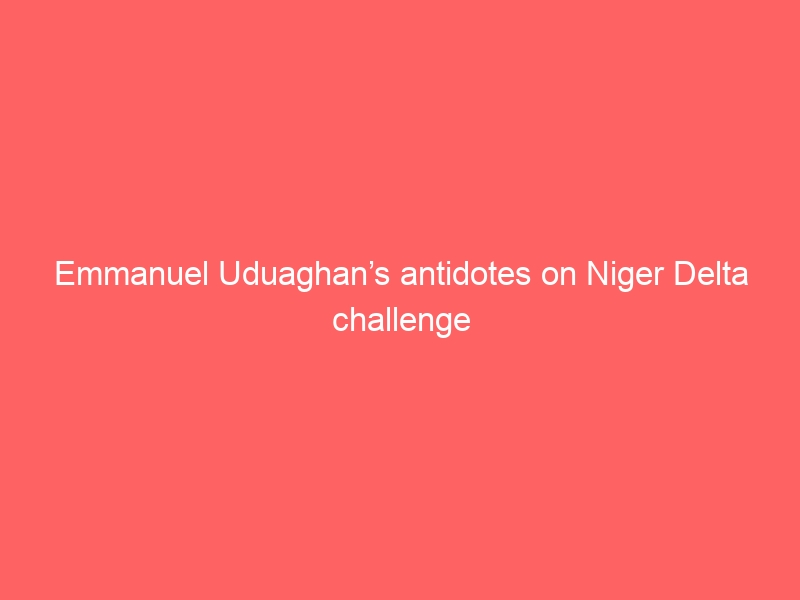By Jerome Mario-Utomi
In a piece entitled; Banters in Lagos, Poverty and Disease in the Niger Delta, posted about four years ago, precisely in February 2018. Aside from spreading out the needs, interests, aspirations and even their problems were critically reviewed against solution plans and implementation, it among other concerns posited the following comparative scrutiny/conclusions; namely, first, that while the Executives of Oil Companies in Nigeria daily exchange banter/pleasantries in Lagos and Abuja, poverty, disease and illiteracy orchestrated by crude oil exploration and production activities walk the creeks, rivers and estuaries of the Niger Delta.
Secondly and very important, at the same time as the oil giants look into the future with high hopes, the people of the region where the crude oil is domiciled bemoan their fate in their sorrows and their hardship.
Thirdly and most fundamental, that whereas the Oil Chiefs who are predominantly resident in Lagos/Abuja, daily sing the songs of praise and claims the ‘wisdom of Solomon’, the real owners of the ‘black gold’ in the creeks and coastal areas of Niger Delta, not only study the ‘book of lamentation’ but manifests hopelessness and economic powerlessness as majority of these organizations operating in their locations neither believe in the principle of ‘equal sorrow’ nor abide by the tenets of the corporate social responsibility (CSR).
The said piece, however, concluded that though faced with interminable socioeconomic and environmental challenges, one thing is sure. Niger Deltans are troubled but not despondent. A situation that makes it easy for them to be managed and contained if only the federal government could come up with a plan and political will to tackle the challenges as currently faced by the people of the region.
After about four years of that piece, a thorough examination of a recent keynote speech presented by the immediate past Governor of Delta state, Dr. Emmanuel Eweta Udughan, on Thursday October 21, 2021, at the Delta Online Publisher Forum (DOPF) annual lecture held at Banquet Hall, Orchids Hotel, Asaba, Delta state shows that each of them has something in common.
Speaking on the topic; Niger Delta Economy; Building a New Face for the Region, the former Governor called on the region handlers to invest more on human capital development programmes/initiatives on prospective youths and women as a way of ensuring sustainable socioeconomic development of the region. Noting that this can be achieved via fostering of collaboration/inter/intra-regional trades among Niger Delta people as well as diversification of Niger Delta Economy.
Speaking on the topic; Niger Delta Economy; Building a New Face for the Region, the former Governor called on the region handlers to invest more on human capital development programmes/initiatives on prospective youths and women as a way of ensuring sustainable socioeconomic development of the region. Noting that this can be achieved via fostering of collaboration/inter/intra-regional trades among Niger Delta people as well as diversification of Niger Delta Economy.
In his words, Niger Delta is well geographically positioned and endowed with human and natural resources. But we need investments in/for infrastructural development, peace and security. Human capital, he explained, refers to the economic value of knowledge, experience and skills of a group of people in a state, Local Government or an entire region as the Niger Delta. There is a strong relationship between human capital and economic growth.
He argued that it is in the interest of each administrative state within the Niger Delta to purposely invest in skills and knowledge through education, competence training and health. Any financial investments made on human capital development do have a direct relationship with socioeconomic growth of the Niger region. He concluded.
To buttress his claim, the former Delta state Governor added that the Delta state Micro Credit Programme (DCMP) was a financial empowerment programme, under his administration, aimed at providing interest free loans and mentorship to prospective and entrepreneurial youth including women in agro-processing, diverse business start ups, fintech, agriculture and other creative activities. He told the gathering that the initiative produced 21, 000 entrepreneurs and artisans in 730 clusters from 25 Local Governments of the state.
Now, this piece will spread its wings on the particulars adduced by Uduaghan as to why the region urgently needs to wear a new face.
On the urgent need to diversify the Niger Delta economy through adoption of the mantra ‘ Niger Delta Beyond Oil”, Udughan stated that 85 percent of the population, informal enterprises are the primary sources of livelihood , but these are characterized by low productivity and wages. “Nigeria ranks fourth among cocoa producers in the world, and the Niger Delta region produces 53% of the country’s output. It is an important crop-earning non-oil foreign exchange. Cross River, Ondo and Edo states are leading producers in the Niger Delta region, producing about 97% of the region’s cocoa. The major processing for cocoa is in Western Nigeria, around Lagos, so major value addition takes place outside of the Niger Delta region’’. On the way forward, the former governor advised that improving rural competitiveness in nontraditional agricultural products through value added export could be one major source of economic diversification. The region he said can readily produce rice, sugar, cocoa, roots and tubers, citrus fruits, plantains, rubber and rubber products.
On the urgent need to diversify the Niger Delta economy through adoption of the mantra ‘ Niger Delta Beyond Oil”, Udughan stated that 85 percent of the population, informal enterprises are the primary sources of livelihood , but these are characterized by low productivity and wages. “Nigeria ranks fourth among cocoa producers in the world, and the Niger Delta region produces 53% of the country’s output. It is an important crop-earning non-oil foreign exchange. Cross River, Ondo and Edo states are leading producers in the Niger Delta region, producing about 97% of the region’s cocoa. The major processing for cocoa is in Western Nigeria, around Lagos, so major value addition takes place outside of the Niger Delta region’’. On the way forward, the former governor advised that improving rural competitiveness in nontraditional agricultural products through value added export could be one major source of economic diversification. The region he said can readily produce rice, sugar, cocoa, roots and tubers, citrus fruits, plantains, rubber and rubber products.
He said something else that has to do with imperatives for economic improvement.
Beginning with biodiversity, the region he said is home to the largest contiguous mangrove forest or wetlands in Africa and third largest in the world with an extensive freshwater swamp forest and rich biological diversity. This factor makes the region key to agriculture/agro-processing with capacities in areas such as wholesale/retail commerce, manufacturing, aquaculture, transportation, construction and other creative activities.
Away from possession of biodiversity to its geographical and population advantages, Udughan observed that the region is bounded by the Atlantic Ocean and blessed with a coastline extending from the mouth of Benin River to the Imo River Estuary and spans about 500km. He added that over 62% of the region’s population are 30 years or younger and are growing youths. With an estimated population of 31 million, the region accounts for approximately 24% of the total population of Nigeria.
From the above realities, particularly the availability of coastline, it is obvious that the Niger Delta seaports, if developed, are very key infrastructure that will support and facilitate manufacturing process and business development. As sea ports are globally acknowledged as development agents and growth drivers, it goes without saying that making the existing seaports in the region to function in their full operating capacities will only reverse their fortunes as sea-land interface structure but will once again revive the once active but now dying market outpost which the port towns of Warri, Sapele, Burutu, Port Harcourt, Onne and Calabar.
Beginning with biodiversity, the region he said is home to the largest contiguous mangrove forest or wetlands in Africa and third largest in the world with an extensive freshwater swamp forest and rich biological diversity. This factor makes the region key to agriculture/agro-processing with capacities in areas such as wholesale/retail commerce, manufacturing, aquaculture, transportation, construction and other creative activities.
Away from possession of biodiversity to its geographical and population advantages, Udughan observed that the region is bounded by the Atlantic Ocean and blessed with a coastline extending from the mouth of Benin River to the Imo River Estuary and spans about 500km. He added that over 62% of the region’s population are 30 years or younger and are growing youths. With an estimated population of 31 million, the region accounts for approximately 24% of the total population of Nigeria.
From the above realities, particularly the availability of coastline, it is obvious that the Niger Delta seaports, if developed, are very key infrastructure that will support and facilitate manufacturing process and business development. As sea ports are globally acknowledged as development agents and growth drivers, it goes without saying that making the existing seaports in the region to function in their full operating capacities will only reverse their fortunes as sea-land interface structure but will once again revive the once active but now dying market outpost which the port towns of Warri, Sapele, Burutu, Port Harcourt, Onne and Calabar.












